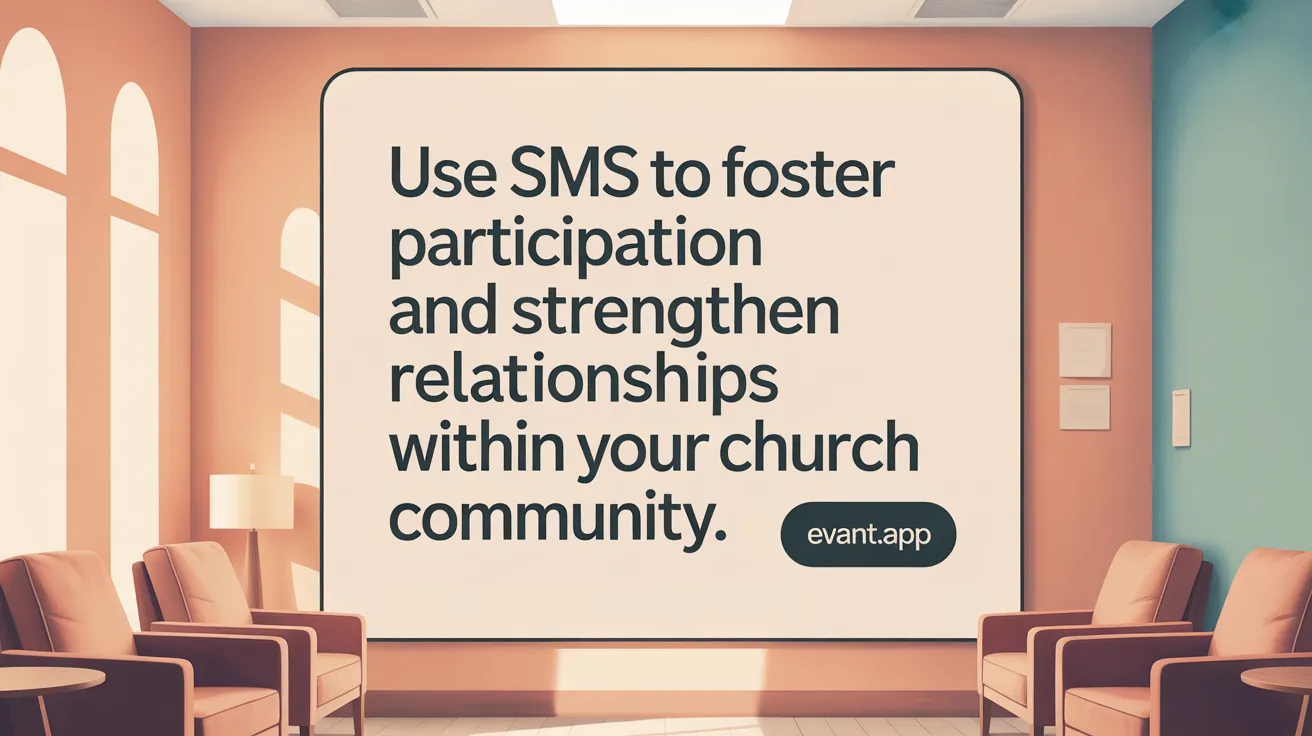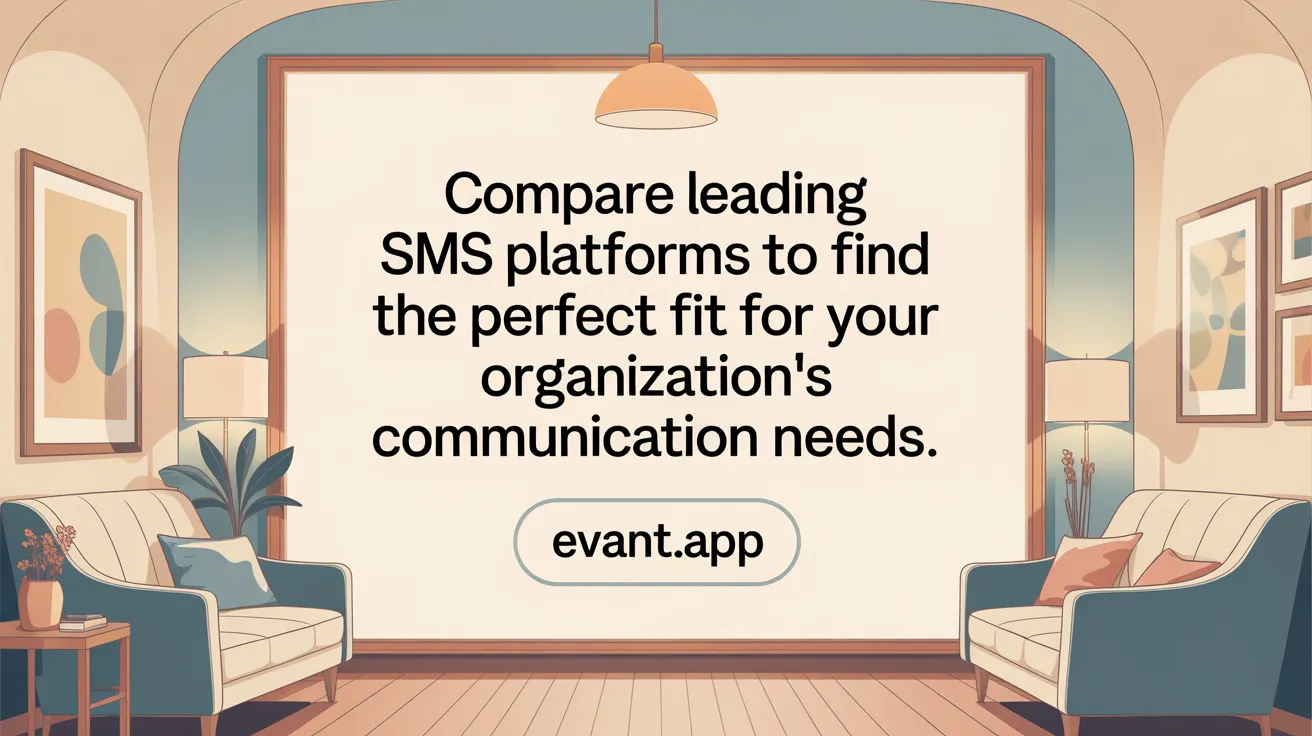The Power of Text Messaging in Modern Church Outreach
In an era where digital communication dominates, churches are increasingly adopting text messaging as a vital tool to invite, engage, and strengthen their congregations. The immediacy, personalization, and exceptional open rates of SMS present a transformative opportunity for churches to foster community, boost participation, and streamline communication. This article explores comprehensive strategies, best practices, and practical tools for leveraging text-to-RSVP and other SMS capabilities to build stronger, more connected church communities.
Strategic Text Messaging for Church Event Invitations and Attendance Confirmation
What are effective strategies for using text messaging to invite and confirm attendance at church events?
Utilizing text messaging for church event invitations involves crafting a personal and approachable tone. Using local phone numbers for messaging helps build trust, making the communication feel more direct and heartfelt. Sending a series of well-timed messages can create anticipation and remind members to participate. For example, an invitation mid-week, a reminder on Saturday, and a follow-up afterward can significantly increase attendance.
The Sermon Series Bump technique illustrates this by sending a series of concise, engaging messages that motivate members to attend. It is essential to keep messages short, straightforward, and include a clear call to action, such as "RSVP now" or "Save your spot." Easy options for responses, like clicking a link or replying with a simple keyword, streamline the process.
Personalization plays a vital role. Addressing recipients by name, referencing past participation, or tailoring messages based on interests make communication more relevant. Avoiding overly automated or generic messages helps maintain a genuine connection.
Post-event follow-ups are just as important. Sending thanks or sharing highlights encourages ongoing engagement. Consistent, relevant, and personalized messaging fosters a stronger sense of community, resulting in higher turnout and sustained involvement.
In summary, effective SMS strategies involve personalized, timely communication with simple responses, combined with thoughtful follow-up to nurture relationships and boost attendance.
Best Practices and Tools for Crafting Effective Church Invitations and RSVP SMS Communications

What are the best practices and tools for creating effective church invitations and RSVP communications via SMS?
Creating impactful church invitations and RSVP messages requires a focus on clarity and engagement. Messages should be concise, ideally within 160 characters, to ensure they're easily read and understood.
A strong call-to-action (CTA) is essential. Providing clear instructions, such as "Reply YES to RSVP" or including direct links for registration, encourages responses and simplifies RSVP collection.
Utilizing church-specific templates can streamline message creation. These templates often include proven wording for invitations, follow-ups, and prayer requests, making communication consistent and professional.
Scheduling messages thoughtfully ensures timely delivery. Sending reminders before events or follow-ups after attendance keeps community members engaged.
Automation tools like SMS marketing platforms (e.g., MessageDesk, Text In Church, or Thithe.ly) help manage contact lists, segment audiences, and set up automated sequences. This ongoing communication increases participation and keeps members informed.
Incorporating multimedia content such as sermon recordings, Bible verses, or event photos enriches messages and fosters a deeper spiritual connection.
Since SMS boasts high open (up to 98%) and response (up to 45%) rates, utilizing these tools effectively can significantly boost attendance and engagement. Combining personalized messaging with automation and multimedia ensures your church's outreach is both impactful and efficient.
Overall, a strategic blend of clear messaging, automation, templates, and multimedia content offers the best approach to successful church invitations and RSVP communications via SMS, strengthening community bonds and encouraging active participation.
Enhancing Engagement and Community Building through SMS Messaging in Churches

Uses of SMS to Enhance Participation and Communication
Churches utilize SMS messaging as a powerful tool to foster increased participation and streamline communication. With features like mass text blasts, automated messages, and two-way SMS, churches can effortlessly send event reminders, prayer requests, and volunteer prompts. This immediacy helps keep members informed about upcoming activities and encourages active involvement.
The convenience of mobile communication also allows churches to easily promote sign-ups for devotional groups, workshops, or fundraising campaigns. Personalization options, such as addressing members by name and tailoring messages based on interests, make interactions more meaningful.
Sharing Inspirational Content and Updates
In addition to logistical communication, SMS serves as a channel for sharing spiritual encouragement. Churches often send scripture verses, inspirational quotes, or daily devotionals through scheduled texts, creating a sense of ongoing spiritual connection.
During special occasions or current events, churches can quickly share updates, sermon recordings, or photos from events. This real-time sharing helps maintain engagement and reinforces community bonds, even for those unable to attend in person.
Handling Urgent Prayer and Emergency Requests
One of the most vital uses of SMS in church management is facilitating urgent communication. When immediate prayer support or emergency assistance is needed, churches can send quick alerts to large sections of their congregation.
This capability ensures that members are promptly informed and can respond swiftly, providing comfort and practical support in times of crisis. The high open rate (up to 98%) of text messages guarantees that urgent messages reach their recipients without delay.
Facilitating Two-Way Communication
SMS also enables dynamic interaction between church leaders and members. Through polls, prayer request forms, or Q&A sessions, churches can gather feedback and foster dialogue.
This two-way communication not only enhances engagement but also helps church leaders understand congregation needs better. Additionally, features like keywords and autoresponders streamline responses, making the communication process more efficient.
By combining these functionalities, SMS messaging acts as a bridge for real-time, personalized, and impactful interaction, strengthening the community spirit and ensuring that every member feels connected and supported within the church environment.
Benefits and Implementation Guidelines for Church-Specific Texting Services and Templates
 Church-specific texting platforms offer numerous advantages that help congregations communicate more effectively. These services enable churches to send personalized, immediate messages such as prayer requests, event reminders, and sermon updates. This direct approach ensures that congregation members stay informed and engaged, fostering a stronger community.
Church-specific texting platforms offer numerous advantages that help congregations communicate more effectively. These services enable churches to send personalized, immediate messages such as prayer requests, event reminders, and sermon updates. This direct approach ensures that congregation members stay informed and engaged, fostering a stronger community.
Using templates for messages enhances communication efficiency and maintains a consistent, professional tone across outreach efforts. Templates can be customized for different scenarios, including first-time visitor invitations, follow-ups, or volunteer requests, saving time and ensuring clarity.
Modern church texting platforms come equipped with automation, segmentation, and personalization features. Automation allows churches to schedule messages and send automated responses, reducing manual work. Segmentation enables targeting specific groups within the congregation based on demographics or interests, making messages more relevant. Personalization—such as including members' names or specific prayer needs—further increases engagement.
Implementing these services successfully requires attention to compliance and privacy. Churches should choose platforms that adhere to regulations like GDPR or HIPAA and promote opt-in enrollment through multiple channels like bulletins, social media, and during services. Transparent communication about data usage builds trust.
Staff or volunteers should be trained on how to use the platform effectively. Proper training covers creating templates, managing contact lists, scheduling messages, and responding to replies. Integrating texting services with existing church management tools and donation platforms can streamline operations and enhance fundraising campaigns.
Monitoring analytics and tracking responses helps refine messaging strategies over time, boosting attendance, engagement, and donations. When well executed, church-specific texting services become invaluable tools for building community, supporting outreach, and fostering spiritual growth.
Guidelines for Crafting Digital Invitations and Utilizing SMS to Grow and Retain Church Congregations
What guidelines should be followed when crafting digital invitations and utilizing SMS to grow and retain church congregations?
Creating effective digital invitations and using SMS as a communication tool requires thoughtful planning and adherence to best practices. First, messages should be clear, concise, and reflect the warmth and values of the church community. Incorporate important details like event dates, times, locations, and a simple RSVP process, such as linking to a Google Form or church website.
Since SMS has high open rates—up to 98%—it is a powerful method for immediate engagement. Churches can send timely reminders before events, share inspiring scripture verses, and extend personalized invitations that resonate with recipients. Using language that is welcoming and encouraging helps foster a sense of belonging.
Obtaining explicit consent from members before sending messages is essential for legal compliance and maintaining trust. Setting expectations about the type of messages they will receive and providing easy options to opt-out builds transparency.
Two-way communication enhances engagement. Facilitating responses via keywords, polls, prayer requests, or Q&A sessions allows congregation members to participate actively, strengthening community bonds.
Strategic scheduling is vital; messages should be sent at appropriate times to avoid disturbance and maximize impact. Integrating SMS campaigns with other channels like email, social media, and church websites creates a multi-layered outreach strategy.
Finally, tracking engagement metrics—such as open rates, response rates, and click-through statistics—enables churches to refine their messaging, improve RSVP rates, and measure spiritual and community growth. By thoughtfully applying these guidelines, churches can foster stronger connections, boost participation, and nurture their congregation’s spiritual journey.
Facilitating Community Participation and Strengthening Church Relationships via Text Messaging

How can text messaging be used to facilitate community participation and strengthen church relationships?
Text messaging has become an essential communication tool for churches seeking to deepen community bonds and encourage active involvement. By delivering immediate, personalized messages, churches can effectively invite members to events, send timely reminders, and follow up after gatherings to nurture ongoing engagement.
One of the main advantages of church texting services is the ability to share information quickly during emergencies, schedule changes, or special occasions, ensuring everyone stays informed. Automated responses and keyword-based autoresponders streamline communication, providing instant information and prompting responses.
Furthermore, two-way messaging opens channels for feedback, prayer requests, and pastoral support, making members feel heard and cared for. This interaction fosters a sense of belonging and trust within the community.
Segmented outreach allows churches to tailor messages for different groups—such as youth ministries, seniors, or new attendees—making communications more relevant and effective. This targeted approach is especially appealing to younger generations who favor personalized, mobile-friendly interactions.
Overall, using SMS not only boosts church event participation but also nurtures spiritual growth through consistent contact, encouraging members to stay connected, engaged, and supported in their faith journey.
| Strategy | Purpose | Details |
|---|---|---|
| Invitations & Reminders | Drive attendance | Send event invites, reminders, and follow-ups |
| Two-way Messaging | Foster communication | Enable feedback, prayer requests, and pastoral support |
| Segmented Outreach | Increase relevance | Target specific groups based on demographics or interests |
| Engagement with Youth | Build relationships with younger members | Personalized, multimedia messages, event invites |
| Promoting Discipleship | Encourage ongoing spiritual growth | Share devotionals, scripture verses, and class info |
Comparing and Selecting SMS Platforms Tailored for Church Communication Needs
 When it comes to selecting an SMS platform for church communication, churches need to carefully evaluate several aspects to find the best fit for their community. Key features such as mass texting, automation, and integration capabilities are crucial. Mass texting allows churches to send announcements, event reminders, and prayer requests simultaneously to large groups, making communication efficient. Automation features, like scheduled messages and autoresponders, help streamline ongoing outreach efforts, ensuring timely and consistent messaging. Integration with church management tools, such as Google Sheets, Calendly, and other software via platforms like Zapier, can enhance operational workflows and tracking.
When it comes to selecting an SMS platform for church communication, churches need to carefully evaluate several aspects to find the best fit for their community. Key features such as mass texting, automation, and integration capabilities are crucial. Mass texting allows churches to send announcements, event reminders, and prayer requests simultaneously to large groups, making communication efficient. Automation features, like scheduled messages and autoresponders, help streamline ongoing outreach efforts, ensuring timely and consistent messaging. Integration with church management tools, such as Google Sheets, Calendly, and other software via platforms like Zapier, can enhance operational workflows and tracking.
Ease of use is another significant consideration. Platforms like Flocknote and PastorsLine are popular choices because of their intuitive interfaces and support services. Scalability is also essential; the platform should accommodate current congregation size and future growth without requiring overhauls. Support services, including training and customer assistance, ensure smooth implementation and ongoing operation.
Pricing varies across platforms, ranging from free trials to tiered subscription plans based on membership numbers and feature sets. Churches must analyze their budget to determine which services offer the best value. Security, privacy, and compliance are non-negotiable, especially when handling personal contact information. Platforms should adhere to data protection laws and offer encryption options.
To ensure the chosen platform meets their specific needs, churches should test demo versions and read user reviews. This hands-on approach helps identify ease of use, effectiveness, and customer support quality. Balancing features, cost, security, and usability allows churches to select an SMS tool that supports effective community building and timely communication.
Below is a comparison table highlighting important features and considerations for different platforms:
| Feature/Factor | MessageDesk | Flocknote | Thithe.ly | PastorsLine | Key Benefits / Details | |-------------------------|--------------|----------|-----------|--------------|----------------------------------------------------------------------| | Mass Texting | Yes | Yes | Yes | Yes | Send SMS to large groups quickly. Supports personalized messages. | | Automation | Yes | Yes | Yes | Yes | Automate reminders, follow-ups, and responses. | | Integrations | Yes (Google Sheets, Zapier) | Limited | Yes | Yes | Seamless connection with other church tools. | | Ease of Use | Moderate | High | Moderate | High | Intuitive interfaces make setup easier. | | Scalability | Medium to Large | Small to Large | Small to Medium | Supports growing congregations. | | Customer Support | 24/7 Support | Email & Phone | Email & Chat | Multi-channel support. | | Pricing Models | Subscription tiers | Free trial + paid plans | Flat rate + plans | Custom quotes | Plans suited for different church sizes and budgets. | | Security & Privacy | High | High | High | High | Compliant with data protection regulations. | | Trial Availability | Yes | Yes | Yes | Yes | Test features before committing long-term. |
Choosing the right SMS platform involves balancing these features against the unique needs of your church community. By understanding what each platform offers and assessing how they align with your outreach strategies, you can select a tool that enhances engagement, promotes community, and ensures reliable, secure communication.
Effective Methods to Encourage Responses and Sign-Ups for Church Activities through Messaging
How can churches encourage responses and sign-ups for activities using messaging?
To effectively boost participation, churches should craft messages with clear instructions and personal touches that speak directly to members. Including a strong call to action, such as 'Reply YES to register' or providing embedded links for easy registration, reduces barriers and makes responses straightforward.
Simplifying the RSVP process is crucial. Using reply texts or secure online forms integrated within messages allows members to respond effortlessly without navigating complicated procedures. Sending well-timed reminders and updates about upcoming events helps keep them at the top of mind and encourages last-minute sign-ups.
Incorporating scripture verses, inspirational quotes, or motivational messages within messages can deepen connections and energize participation. These spiritual touches foster a sense of community and shared purpose.
Another effective strategy involves segmenting contact lists based on interests, age groups, or involvement levels. Targeted messages ensure content remains relevant and engaging, increasing the likelihood of responses.
Utilizing professional church messaging services enables automated, personalized communication that maintains a warm and authentic tone. Overall, these approaches create a seamless and encouraging experience that motivates members to participate actively.
Practical Strategies for Building Stronger Church Communities Through SMS Communication
What practical steps and strategies can churches take to build stronger communities through SMS communication?
Building a vibrant church community via SMS begins with obtaining permission from members. Churches should encourage members to opt-in through bulletins, social media, during services, or online forms, ensuring compliance with privacy laws. Once permission is granted, enhancing communication effectiveness involves segmenting contact lists based on demographics, interests, or engagement levels. This approach allows for tailored messaging that resonates more deeply.
Scheduling the right messages at optimal times is crucial. Churches should send concise, meaningful updates like event reminders, prayer requests, and inspirational verses. Timing messages ahead of events or on specific days helps maximize attendance and participation. Tools like automation platforms enable mass messaging and can include features like scheduled texts or automated responses for common inquiries.
Utilizing technology like text-to-give makes donations simple and immediate. Members can contribute by replying to a text with a designated keyword, streamlining fundraising efforts and increasing contributions.
Encouraging two-way dialogue transforms SMS from a one-way broadcast into an interactive channel. Churches can send polls, request prayer requests, or seek feedback, fostering a sense of inclusion and active participation.
Finally, maintaining legal compliance and building trust are vital. Messages should include opt-out options, clearly identify the church, and avoid excessive frequency. Respecting privacy and being transparent enhances member trust, paving the way for sustained engagement and community growth.
Embracing SMS to Cultivate Thriving Church Communities
Text messaging offers churches a dynamic, accessible, and deeply personal way to strengthen bonds, foster engagement, and streamline communication. By employing thoughtful strategies, choosing the right platforms, and crafting messages that resonate, churches can harness SMS to invite greater participation, support spiritual growth, and build communities grounded in connection and faith. Integrating text-to-RSVP and other SMS functionalities into broader outreach efforts ensures churches not only communicate effectively but also cultivate lasting relationships, enriching their congregations in meaningful, measurable ways.
References
- Free Church Invitation Text Message Samples for All Occasions
- Church Texting Service Guide + Church Announcement Templates
- Best Church Texting (SMS) Service - Textedly
- Upgrade Your Church Announcements: 7 Steps to Leverage Text ...
- Mass Texting Software for Churches
- How to Master the Art of Digital Invitations for Your Church Services
- Email Marketing for Churches: Building a Faithful Digital Community
Related Blogs


RSVP Tools: Best Options, Google RSVP Limitations & Why Text Wins
Michael PedoeemExplore the best RSVP tools, Google RSVP’s limitations, and why text RSVP is the most efficient for event planning with instant confirmations and reminders.


My School SMS: Bridging the Gap between Schools, Parents, and Students
Michael PedoeemMy School SMS - What's it all about


Ready to transform your community









